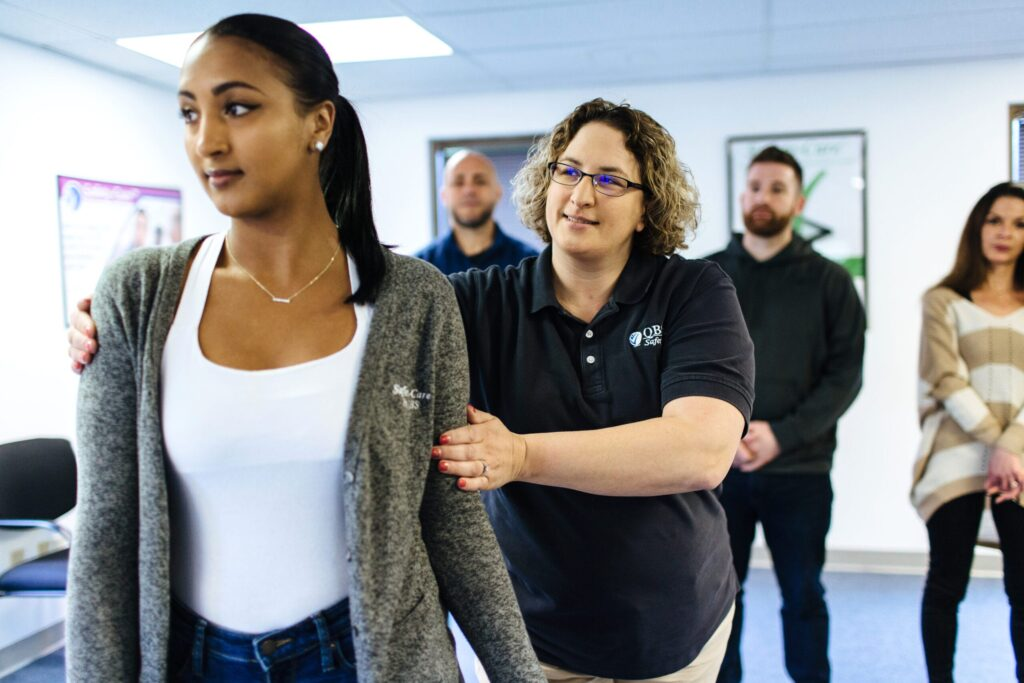Nebraska LB 390 – De-escalation Training for School Resource Officers and Security Guards
The State of Nebraska passed LB 390 in 2021, which established new requirements for the training of school resource officers and security guards. Below is a summary of the legislation and information on how Safety-Care can be used to effectively train staff in methods of de-escalation.
.jpg)
.png?width=88&height=95&name=Group%20137%20(5).png)


How to Implement Safety-Care?
1. Register for a Safety-Care Trainer class or call us to request a closed session for your organization. We regularly conduct classes in all 50 states and Canada.
2. Complete your class to become a certified Safety-Care Trainer for your organization. We bring you to fluency using an errorless teaching methodology.
3. You train and certify your staff in Safety-Care’s effective techniques.
4. Our Master Trainers are available by phone, email, or video to help your organization with any questions or concerns while using or implementing Safety-Care.

Legal Requirements
|
Summary: Effective: January 1, 2021 Last Updated: December, 2024 The State of Nebraska passed LB 390 in 2021, which established new requirements for the training of school resource officers and security guards. Below is a summary of the legislation and information on how Safety-Care can be used to effectively train staff in methods of de-escalation. How Safety-Care aligns: Numerous education organizations throughout the United States and Canada rely upon QBS and our Safety-Care training to provide their staff members with the training they need to help maintain a safe and healthy environment. Safety-Care provides a comprehensive, supportive approach to incident prevention, de-escalation, and management. Your Staff will learn practical strategies for helping students that use evidence-based practices consistent with PBIS (Positive Behavior Interventions and Supports) and ABA (Applied Behavior Analysis). |
|
Section 4. Training Requirements Sec. 4. Each memorandum of understanding required by section 3 of this act shall govern the use of school resource officers or security guards and shall include, but not be limited to, policies that: (1) Require each school resource officer or security guard to attend a minimum of twenty hours of training focused on school-based law enforcement, including, but not limited to, coursework focused on school law, student rights, understanding special needs students and students with disabilities, conflict de-escalation techniques, ethics for school resource officers, teenage brain development, adolescent behavior, implicit bias training, diversity and cultural awareness, trauma informed responses, and preventing violence in school settings; |
|
Section 3. Timeline for the Implementation of the Establishment of a Memorandum of Understanding (1) On or before December 1, 2019, the department shall develop and distribute a model memorandum of understanding that includes the policies required by section 4 of this act. Any law enforcement agency or security agency required to adopt a memorandum of understanding with a school district pursuant to this section that has not developed and adopted a different written memorandum of understanding shall adopt the model memorandum of understanding developed by the department. How Safety-Care aligns: Safety-Care is uniquely designed to provide trainees with the skills to assess potential crises, how de-escalate these situations, and how to respond if the situation is elevated. Our trainings are trauma-informed and focus on modifying behavior to prevent dangerous outcomes. Safety-Care can be taught to all levels of personnel, from administration down to volunteers. Additionally, our core trainings can be supplemented with unique add-on trainings focused on specific needs and professions. Safety-Care uses a Train the Trainer model allowing each district to quickly develop their own core of trainers qualified in the most current behavioral interventions and de-escalation strategies. Our Master Trainers can have up to ten (10) staff ready to train in as little as three days. Safety-Care is geared towards ensuring that all trainees are familiar with a single response system and can respond in-kind to numerous situations regardless of the professional setting. |
Why Safety-Care?
Benefits & Differentiators
In addition to Safety-Care being highly cost-effective, you get:

Skills to effectively prevent, minimize, & manage behavioral challenges with dignity, safety, & the possibility of change

Decreases in staff and patient injuries and reduction in restraint & seclusion time

Instructional procedures based on decades of evidence-based research & compatible with ABA, PBIS & reinforcement-based environments

Customizable program for your setting, staff & clientele, with a strong focus on preventative via non-intrusive, replacement behaviors

Extremely rigorous standards grounded in errorless teaching methodology

Small, intimate class sizes backed by unlimited support & resources
How Is Safety-Care So Effective?
A Genuine Focus on Implementing & Managing Positive Behavioral Skills
Proactive, environmental management recommendations
Understanding of evocative effects of staff behavior
In-depth analysis of antecedents and proactive antecedent interventions
Evidence-based reinforcement procedures
Required competency in de-escalation skills
Humane, non-invasive touch and QBS Check™ strategies
Evidence-based teaching procedures
Applicable to a wide array of settings, conditions & challenging behavior





